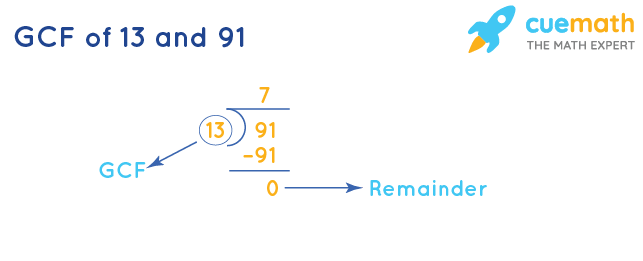GCF of 13 and 91
GCF of 13 and 91 is the largest possible number that divides 13 and 91 exactly without any remainder. The factors of 13 and 91 are 1, 13 and 1, 7, 13, 91 respectively. There are 3 commonly used methods to find the GCF of 13 and 91 - long division, Euclidean algorithm, and prime factorization.
| 1. | GCF of 13 and 91 |
| 2. | List of Methods |
| 3. | Solved Examples |
| 4. | FAQs |
What is GCF of 13 and 91?
Answer: GCF of 13 and 91 is 13.

Explanation:
The GCF of two non-zero integers, x(13) and y(91), is the greatest positive integer m(13) that divides both x(13) and y(91) without any remainder.
Methods to Find GCF of 13 and 91
Let's look at the different methods for finding the GCF of 13 and 91.
- Prime Factorization Method
- Long Division Method
- Listing Common Factors
GCF of 13 and 91 by Prime Factorization
Prime factorization of 13 and 91 is (13) and (7 × 13) respectively. As visible, 13 and 91 have only one common prime factor i.e. 13. Hence, the GCF of 13 and 91 is 13.
GCF of 13 and 91 by Long Division

GCF of 13 and 91 is the divisor that we get when the remainder becomes 0 after doing long division repeatedly.
- Step 1: Divide 91 (larger number) by 13 (smaller number).
- Step 2: Since the remainder = 0, the divisor (13) is the GCF of 13 and 91.
The corresponding divisor (13) is the GCF of 13 and 91.
GCF of 13 and 91 by Listing Common Factors
- Factors of 13: 1, 13
- Factors of 91: 1, 7, 13, 91
There are 2 common factors of 13 and 91, that are 1 and 13. Therefore, the greatest common factor of 13 and 91 is 13.
☛ Also Check:
- GCF of 45 and 72 = 9
- GCF of 50 and 75 = 25
- GCF of 51 and 68 = 17
- GCF of 63 and 54 = 9
- GCF of 72 and 84 = 12
- GCF of 33 and 66 = 33
- GCF of 14 and 21 = 7
GCF of 13 and 91 Examples
-
Example 1: For two numbers, GCF = 13 and LCM = 91. If one number is 91, find the other number.
Solution:
Given: GCF (y, 91) = 13 and LCM (y, 91) = 91
∵ GCF × LCM = 91 × (y)
⇒ y = (GCF × LCM)/91
⇒ y = (13 × 91)/91
⇒ y = 13
Therefore, the other number is 13. -
Example 2: The product of two numbers is 1183. If their GCF is 13, what is their LCM?
Solution:
Given: GCF = 13 and product of numbers = 1183
∵ LCM × GCF = product of numbers
⇒ LCM = Product/GCF = 1183/13
Therefore, the LCM is 91. -
Example 3: Find the greatest number that divides 13 and 91 exactly.
Solution:
The greatest number that divides 13 and 91 exactly is their greatest common factor, i.e. GCF of 13 and 91.
⇒ Factors of 13 and 91:- Factors of 13 = 1, 13
- Factors of 91 = 1, 7, 13, 91
Therefore, the GCF of 13 and 91 is 13.

FAQs on GCF of 13 and 91
What is the GCF of 13 and 91?
The GCF of 13 and 91 is 13. To calculate the greatest common factor (GCF) of 13 and 91, we need to factor each number (factors of 13 = 1, 13; factors of 91 = 1, 7, 13, 91) and choose the greatest factor that exactly divides both 13 and 91, i.e., 13.
What is the Relation Between LCM and GCF of 13, 91?
The following equation can be used to express the relation between Least Common Multiple and GCF of 13 and 91, i.e. GCF × LCM = 13 × 91.
What are the Methods to Find GCF of 13 and 91?
There are three commonly used methods to find the GCF of 13 and 91.
- By Prime Factorization
- By Listing Common Factors
- By Long Division
If the GCF of 91 and 13 is 13, Find its LCM.
GCF(91, 13) × LCM(91, 13) = 91 × 13
Since the GCF of 91 and 13 = 13
⇒ 13 × LCM(91, 13) = 1183
Therefore, LCM = 91
☛ GCF Calculator
How to Find the GCF of 13 and 91 by Prime Factorization?
To find the GCF of 13 and 91, we will find the prime factorization of the given numbers, i.e. 13 = 13; 91 = 7 × 13.
⇒ Since 13 is the only common prime factor of 13 and 91. Hence, GCF (13, 91) = 13.
☛ Prime Numbers
How to Find the GCF of 13 and 91 by Long Division Method?
To find the GCF of 13, 91 using long division method, 91 is divided by 13. The corresponding divisor (13) when remainder equals 0 is taken as GCF.
visual curriculum
